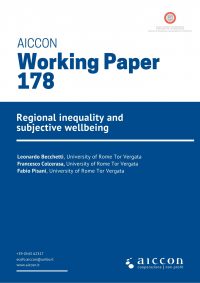178 – Regional inequality and subjective wellbeing
Abstract
We contribute to the literature investigating the relationship between subjective wellbeing and income inequality by testing the nexus between the two variables using regional inequality indicators and individual data from the cross-country European Social Survey sample.
We find evidence for a nonlinear relationship where life satisfaction is higher in correspondence with low to medium levels of inequality, while the effect becomes negative when inequality passes an intermediate threshold.
Our findings are robust when estimated in sample splits based on relative income position and individual preferences for inequality and redistribution policies.
A likely rationale for our nonlinear finding is that the Hirshmann’s tunnel effect (and the positive effect of social mobility) prevails for low levels of inequality, while inequality aversion and negative relative income effects hit when inequality becomes more serious.
Keywords: subjective wellbeing, inequality, nonlinear effect.
JEL Numbers: I30, I31.

